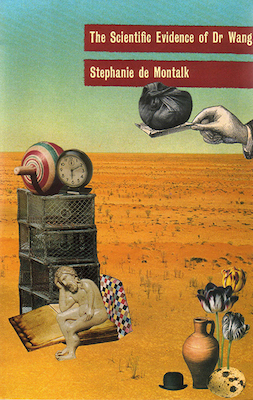
Cover Design
Brendan O'Brien
Victoria University Press, 2002
Dr Wang makes narrative sense of the alchemy of everyday life – that puzzling domain of hearsay, fact and opinion – and in accordance with his status as an expert witness, he presents his testimony with clarity and precision. And his evidence is that, as long as the world is as round as an orange, ideas will form, words and stories will follow, and wonderful things will happen. But will his conclusions give rise to complaints? Is his treatment of political issues too lengthy, his vocabulary too plain, his view of life too moderate and optimistic? What of grief and loss? The outer limits? The gulf between Olympus and suffering man?
TREE MARRIAGE
When the Dandy of Bath died
his mistress put dust
covers over his tailor
and wigmaker and left
his Palladian mansion
to live in a tree
surrounded by heartwood,
broad leaves and, no longer
in need of clothing,
admiration in a natural setting.
She bought an embroidery frame
on which to record her impressions
of silence, shade and the beat
of rain in the branches,
themes of soil and sky,
observations only possible
some distance from the ground,
abstractions she could work up
into tapestries
at a later stage.
The tree’s girth was her temple,
its limbs her romantic imagination –
all olive brown in the evening
and at dawn as pale and grey as King Arthur.
She also recovered her sense of theatre
and original freshness,
learnt to be patient
with lichen and rough skin
and careful with candles
and winter fires
which she lit
in small tins.
‘De Montalk has produced a book full of candour and feeling. It has a real depth to it. [...] The reader is left reflecting on acts of kindness, the quiet
of the night, fires being lit, “the sky sailing, rolling gently”. I loved the beautiful stark imagery in ‘Violinist at the Edge of an Icefield’ and the possible
tribute to Leonard Cohen in ‘Famous Blue Raincoat’. [...] an amazing follow-up to Animals Indoors. [...] This is really tender, lush stuff. I think I have
been seduced.’
Hamesh Wyatt, ‘Location of Role Differs in Work of Two Poets’, Otago Daily Times, January 2003.
‘Stephanie de Montalk returns with more of the graceful and gracious writing that distinguished her first collection. With what has been described as
a great sense of the theatrical, de Montalk eloquently writes about the “alchemy of everyday life”’.
Laura Kroetsch, Booknotes, No. 140, Summer 2002.
‘ ... complex, extended pieces, playing with the sensuality of language and sound, yet withholding meaning, offering instead a series of beautifully
honed images, which circle round the trivial and almost humorous. [...] In the opening poem de Montalk writes of “the art of penmanship – /the
whole art, that is/ of legibility” as “an act of trust”, and it is in this spirit that these poems should be encountered. They do not disappoint.’
Jane Stafford, ‘Poetry as an Act of Trust’,The Dominion Post, 11 January 2003.
Dr Wang’s evidence might be scientific, but de Montalk’s observations of people and the way they speak is also reliable and very astute. [...] Not for quick or careless reading, these are poems to work at, but treated thoughtfully they yield good things. Their best gift is a sharpened awareness that there is more than one viewpoint for everyday life. If or when I enter the imperial villa I shall take my copy of this book. It may help preserve some originality, humour and kindness.’
Robin List, ‘Making Sense of Everyday Life’, Wairarapa Times Age, 16 November 2002.
‘Stephanie de Montalk’s second volume delicately circles “the art of penmanship”. It is a most worthy successor to her award-winning Animals Indoors. Fresh, precise and elegant The Scientific Evidence of Dr Wang presents itself in three parts – the first a series of charming profiles of a retired barrister, an exercise master, a dissident, an artisan, a solderer and more. Part Two is more personal with intimate snapshots [...] And Part Three opens the door on the world outside. A sturdy subtext underlies each piece, whether it be a fanciful opinion about the habits of Mrs Pobjoy, the last mistress of Beau Nash, who after he dies “recovered her sense of theatre and original freshness, learnt to be patient” – or a story of ancient Mesopotamian hero Gilgamesh who each morning “whistles as he greets the sun – clad as if for a courtly encounter”’.
Penelope Bieder, ‘Baring Poetic Souls’, Weekend Herald, 1—2 February 2003.
‘ ... poems that echo the tone of the historical narratives of the Greek poet Cavafy. [...] Many of the poems show a particular strength in providing details which make real what experience is like – the “thickness” of experience – rather than giving a sense that the images are carefully chosen correlatives for something else. [...] De Montalk likes to take on big topics: colonialism, displacement of peoples, varieties of loss, death and grieving. Here she operates with a light touch, with an awareness of the cyclical nature of these events. [...] In the concluding poems [...] she returns to simplicity and intimacies, the images pared away to bareness. This gift for simplicity remains the strongest impression from this collection.’
John Horrocks, ‘Verbal Aerobics and Intimacies’, New Zealand Books, June 2003.